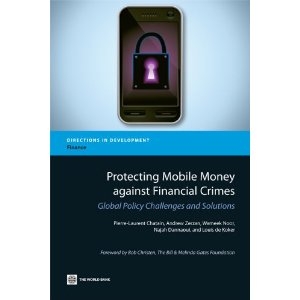Deakin expert and World Bank team tackle mobile banking security
Research news
A new book aimed at preserving the integrity of mobile banking, co-authored by Deakin University’s international financial crime expert, Professor Louis de Koker, and a team from the World Bank led by Pierre-Laurent Chatain has just been released.
The book Protecting Mobile Money Against Financial Crimes: Global Policy Challenges and Solutions outlines approaches that can help countries mitigate the risks associated with using mobile phone financial services.
Professor de Koker said mobile banking was revolutionising the way financial services were delivered to people in rural and remote areas who did not have access to the formal banking system. This is especially the case in developing countries.
“The G20 has placed financial inclusion on its priority agenda, to help over two billion adults worldwide who continue to be exploited by predatory lending practices and deprived of access to financial institutions,” he said.
“According to GSMA, which represents the interests of the global communications industry, more than 80 percent of mobile banking services are located in developing markets but more than 1 billion mobile phone users still have no access to formal financial services.
“People can be excluded from the banking system through a range of factors, for example, some deposit accounts may require minimum balances, levels of income or formal employment, which can exclude the poor and/or unemployed, or they have to travel long distances to access their account.
“As they still need access to money and in the cases of migrant workers to move money home, they will seek to use ‘services’ which are informal and unregulated.
“This exposes them to exploitation but also creates large informal flows of money which are unregulated and able to be used to finance terrorism or crime.”
Professor de Koker said the guidance in the book was based on fieldwork in eight markets including Kenya, Malaysia, Mexico, the Philippines and Zambia and experience in an additional jurisdictions, including India and South Africa.
“The book assists the financial services and telecommunications industries by providing advice on conducting sound and objective risk assessments. It also advises regulators on practical solutions to the challenge of managing weak identification infrastructure and regulating retail mobile money outlets,” he said.
“We take mobile banking as a given in Australia but in developing countries the opportunity is ripe to replicate the success of services like Kenya’s M-Pesa, which is used by more than 13 million users to save and transfer money.”
“Since being launched in 2007, mobile banking service M-Pesa has helped over 50 percent of Kenya’s poorest households to start saving without incurring onerous bank fees, expand the reach of their small enterprises, and safely receive money remitted by relatives, boosting rural financial and social security.
“However, this delivery of mobile money services is hampered by poorly designed regulatory frameworks in many countries.
“The book provides policy makers and industry stakeholders with guidance on financial crime concerns that will enable them to deliver mobile banking services to unbanked clients more effectively.
“This is a particularly important development as mobile money expands even further into countries like the Democratic Republic of Congo, Lesotho, India and Uganda.”
The book is available at http://issuu.com/world.bank.publications/docs/9780821386699
About the World Bank Group
The World Bank Group is one of the world’s largest sources of funding and knowledge for developing countries. It comprises five closely associated institutions: the International Bank for Reconstruction and Development (IBRD) and the International Development Association (IDA), which together form the World Bank; the International Finance Corporation (IFC); the Multilateral Investment Guarantee Agency (MIGA); and the International Centre for Settlement of Investment Disputes (ICSID). Each institution plays a distinct role in the mission to fight poverty and improve living standards for people in the developing world. For more information, please visit www.worldbank.org, www.miga.org, and www.ifc.org.
Share this story

